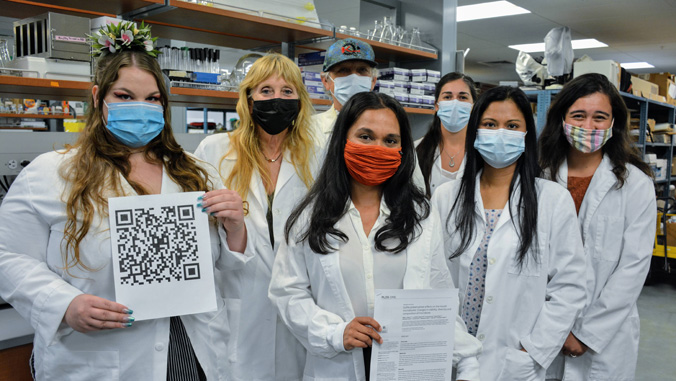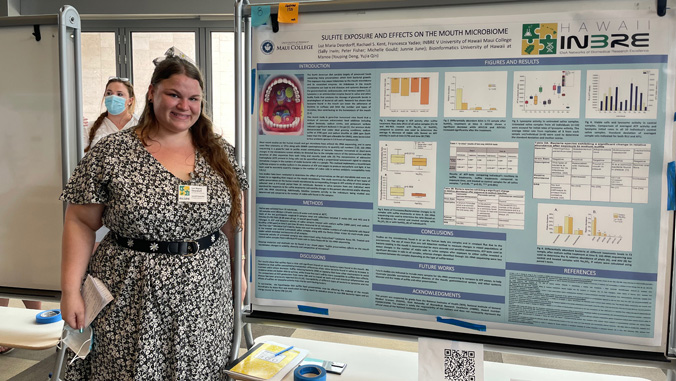
Front row from left: Rachael Kent, Junnie June, Francesca Yadao
The negative effects of food preservatives on the mouth microbiome (the collection of all microbes, such as bacteria, fungi, viruses and their genes, that naturally live inside and on human bodies), are shown through a study by University of Hawaiʻi Maui College students.
Their research highlights a significant and almost immediate impact, with a 26–31% decrease in viable bacteria with less than 10 minutes of exposure to sulfite preservatives, and was published in Plos One.
“Our recent study showed the effects of two types of sulfite preservatives on the composition of the human mouth microbiome (based on saliva samples). This was the first published study that we are aware of to look at food preservative’s effects on the mouth microbiome,” said UH Maui College Professor Sally Irwin, who is also an adjunct professor with the UH Mānoa John A. Burns School of Medicine (JABSOM). “We feel that this is significant because other research has shown the connections between changes in the mouth microbiome and changes in the gut and connections to several human diseases.”
The study concluded that sulfite preservatives (at concentrations regarded as safe by the FDA) alter the abundance and richness of the microbiota found in saliva and decrease the number of viable bacteria.
“This endeavor has changed my life for the better by giving me more confidence to pursue a career in science.”
—Luz Maria Deardorff
The research project started in 2018 with UH Maui College students Racheal Kent, Francesca Yadao and Luz Maria Deardorff, and required about 18 months of developing techniques and optimizing protocols followed by extensive experimentation and data analysis. Faculty involved in the study included Peter Fisher, Michelle Gould, Junnie June and Irwin.
In April, Deardorff, who is now at UH Mānoa studying biological sciences, presented the team’s research at JABSOM and later at a chapter meeting of the American Microbiology Society.
“This research opportunity strengthened my understanding of the scientific method and nuances in conducting experiments. It has provided me with expertise in working in a laboratory that puts me a step ahead of my peers,” Deardorff said. “This endeavor has changed my life for the better by giving me more confidence to pursue a career in science and providing me with a science ʻohana with my research associates and mentors.”
The project was supported by grants from the National Institutes of Health, National Institute of General Medical Sciences and IDeA Networks of Biomedical Research Excellence.
Irwin said, “We feel it’s important for consumers to be aware of the potential negative effects of [sulfites] and other food additives on their mouth and gut microbiomes and to avoid them as much as possible, and rely more on fresh, not processed, foods.”


